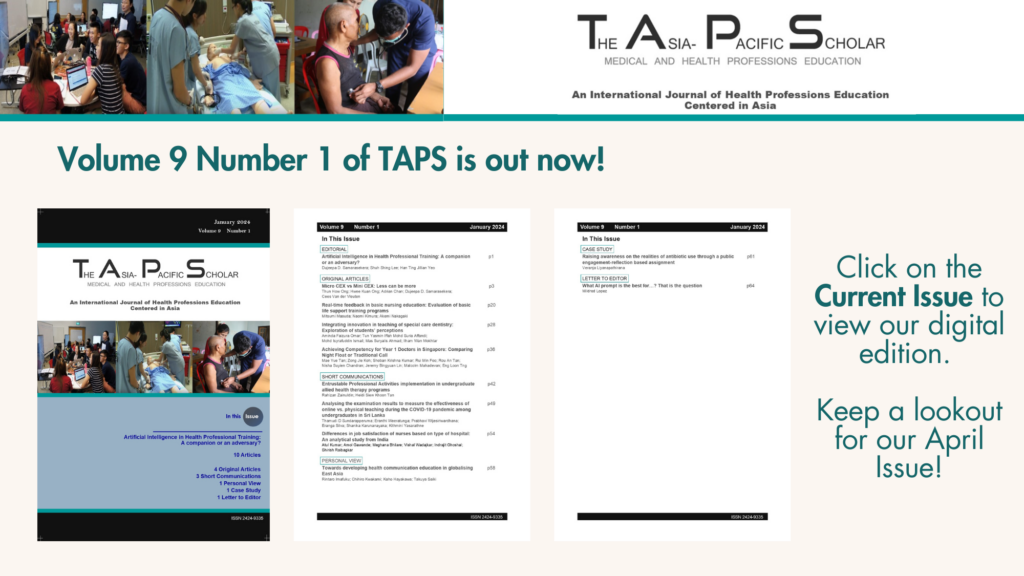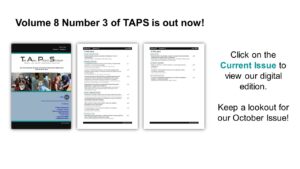Poetry in medicine – Another adjunct to improving Emotional Intelligence?
Submitted: 16 December 2022
Accepted: 3 January 2023
Published online: 4 July, TAPS 2023, 8(3), 68-69
https://doi.org/10.29060/TAPS.2023-8-3/LE2930
David Mathew
Department of Anaesthesia, Khoo Teck Puat Hospital, Singapore
Dear Editor,
I read with great interest the article entitled “The associates of Emotional Intelligence in medical students: A systematic review” (Edussuriya et al., 2022) in your journal published in October 2022. The association of Emotional Intelligence (EI) with wellbeing cannot be underestimated, especially with the plethora of positive effects it has on mental health and academic performance. In fact, I think this can be extended beyond students, to all healthcare professionals.
In my opinion, humanities in medicine provide a potentially novel way of improving emotional intelligence. The writer of a piece acknowledges the scientific experience that has moved him/her, and subsequently reflects on the entire experience through the arts and writing. The process of writing can be cathartic as it presents an avenue for the writer to release emotions that might have been pent-up or hidden as we provide a brave front to our patients. Once written, the piece can be shared, and reach out to other healthcare professionals who might have encountered similar experiences. Some may find comfort in reading such pieces, as they realise they are not alone in experiencing the roller-coaster of emotions in their daily lives.
I have appended a piece I wrote regarding my experience with an obstetrics patient and how sometimes the lesser said, the more it means. The process of writing and sharing this piece helped me better understand and appreciate what I went through and I hope it can do the same for fellow readers.
Cry
The day I saw her cry
was when her baby’s heart
slowed.
She needed the Caesarean
quickly.
Her eyes conceived tears
crawling down her cheeks
shaping into an anxious cry.
I counted the tears
and spoke more words
comforting, reassuring.
I saw her cry
one week later,
this time her littlest bundle
the greatest joy.
Tears of happiness
dancing muted screams of relief
I counted the tears
but spoke nothing
comforting, reassuring.
Tears
instead of words,
won wars of emotions.
And staying silent
might be the most reassuring cry
of comfort.
Note on Contributor
DM came up with the concept of the manuscript, and wrote the entirety of its contents.
Funding
There was no funding for this paper.
Declaration of Interest
There is no conflict of interest declared.
References
Edussuriya, D., Perera, S., Marambe, K., Wijesiriwardena, Y., & Ekanayake, K. (2022). The associates of Emotional Intelligence in medical students: A systematic review. The Asia Pacific Scholar, 7(4), 59–70. https://doi.org/10.29060/taps.2022-7-4/oa2714
*David Mathew
Khoo Teck Puat Hospital,
90 Yishun Central, Singapore
Email: davidmathew3142@gmail.com
Announcements
- Fourth Thematic Issue: Call for Submissions
The Asia Pacific Scholar is now calling for submissions for its Fourth Thematic Publication on “Developing a Holistic Healthcare Practitioner for a Sustainable Future”!
The Guest Editors for this Thematic Issue are A/Prof Marcus Henning and Adj A/Prof Mabel Yap. For more information on paper submissions, check out here! - Best Reviewer Awards 2023
TAPS would like to express gratitude and thanks to an extraordinary group of reviewers who are awarded the Best Reviewer Awards for 2023.
Refer here for the list of recipients. - Most Accessed Article 2023
The Most Accessed Article of 2023 goes to Small, sustainable, steps to success as a scholar in Health Professions Education – Micro (macro and meta) matters.
Congratulations, A/Prof Goh Poh-Sun & Dr Elisabeth Schlegel! - Best Article Award 2023
The Best Article Award of 2023 goes to Increasing the value of Community-Based Education through Interprofessional Education.
Congratulations, Dr Tri Nur Kristina and co-authors! - Volume 9 Number 1 of TAPS is out now! Click on the Current Issue to view our digital edition.

- Best Reviewer Awards 2022
TAPS would like to express gratitude and thanks to an extraordinary group of reviewers who are awarded the Best Reviewer Awards for 2022.
Refer here for the list of recipients. - Most Accessed Article 2022
The Most Accessed Article of 2022 goes to An urgent need to teach complexity science to health science students.
Congratulations, Dr Bhuvan KC and Dr Ravi Shankar. - Best Article Award 2022
The Best Article Award of 2022 goes to From clinician to educator: A scoping review of professional identity and the influence of impostor phenomenon.
Congratulations, Ms Freeman and co-authors. - Volume 8 Number 3 of TAPS is out now! Click on the Current Issue to view our digital edition.

- Best Reviewer Awards 2021
TAPS would like to express gratitude and thanks to an extraordinary group of reviewers who are awarded the Best Reviewer Awards for 2021.
Refer here for the list of recipients. - Most Accessed Article 2021
The Most Accessed Article of 2021 goes to Professional identity formation-oriented mentoring technique as a method to improve self-regulated learning: A mixed-method study.
Congratulations, Assoc/Prof Matsuyama and co-authors. - Best Reviewer Awards 2020
TAPS would like to express gratitude and thanks to an extraordinary group of reviewers who are awarded the Best Reviewer Awards for 2020.
Refer here for the list of recipients. - Most Accessed Article 2020
The Most Accessed Article of 2020 goes to Inter-related issues that impact motivation in biomedical sciences graduate education. Congratulations, Dr Chen Zhi Xiong and co-authors.









